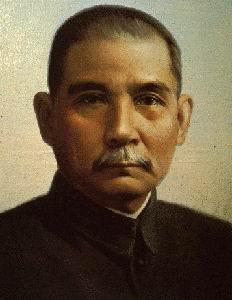
Dr. Sun Yat-sen, born on November 12th, 1866 in Cuiheng Village, was the great forerunner of China’s democratic revolution, winning respect and admiration of the Chinese people and peoples around the world. In the turbulent time in the Chinese history, Sun Yat-sen, with his charisma and political leadership, won the people’s recognition as "Father of China’s Revolution."
He was smart, diligent and brave since he was young. Financed by his brother, Sun Mei, he had studied in Honolulu for five years. He was a good learner and was called as “Mr. Knowledge”, grasping knowledge about politics, economy, agriculture, astronomy and geography of western countries.
Opposing the corrupt court of the Qing Dynasty, he often gathered with Yang Heling, Chen Shaobai and other elites to discuss affairs of state and criticize the court politics. They advocated the ideas of banning opium and establishing education.
He was not only a skillful doctor, but also an expert in the field of architectural design. The Characteristic Sun Yat-sen's former residence in Cuiheng was designed by himself.
On November 12, 1894, Sun Yat-sen organized in Honolulu China’s first bourgeois revolutionary organization, Xingzhong Hui (Revive China Society). Those admitted to the society swore the following oath: “Expel the northern barbarians, revive Zhonghua, and establish a unified government.” In 1896, Sun Yat-sen left San Francisco and stayed in London, where he was kidnapped into the Chinese Embassy. His teachers, Sir James Cantlie and Dr. Patrick Manson, went to every department in London that could possibly help release him. And finally Dr. Sun Yat Sen was released. After that, he wrote “Kidnapped in London”, which helped promote the idea of revolution, disclose the evil scheme of the Qing court, and expand the influence of Revive China Society. During his stay in London, he for the first time put forward his great principles of Nationalism, Democracy and the People's Livelihood - later known as the Three Principles of the People.
In August 1905, he worked with Huang Xing to set up Tongmenghui, also known as Chinese Revolutionary Alliance in Tokyo, Japan. Sun was elected as President. The Tongmenghui's political platform was "To expel the northern barbarians and to revive Zhonghua, to establish a republic, and to distribute land equally among the people."
The 1911 Revolution overthrew the Manchu dynasty. Upon hearing this, Sun immediately went back China from America in late December and was elected President of the provisional government of the Republic of China by representatives from each of the provinces. On January 1st, 1912, The Republic of China was founded in Nanjing and Dr. Sun Yat-sen was sworn in as President.
In the August of 1912, the Revolutionary Alliance made allies with other political organizations to found Kuomintang (KMT). In the January of 1924, the first National Congress of KMT was held in Guangzhou, making its three policies as “allying with Soviet Union, cooperating with the Chinese Communist Party, and promoting peasants and workers’ interests”. The congress passed the new action instruction and new charter of KMT, re-elaborated the Three Principles of the People. Through the congress, KMT was reformed into a revolutionary league, composing workers, peasants, petty bourgeoisie and national bourgeoisie. This was the first united front between the CCP (Communist Party of China) and KMT.
Sun Yat-sen passed away on March 12, 1925 in Beijing at the age of 59. In his will, he wrote, “The work of the Revolution is not yet done. …… We must bring about a thorough awakening of our own people and ally ourselves in a common struggle with those peoples of the world who treat us on the basis of equality.”
Police?Registration?Number:?44200002442868
Website?ID:?4420000052
Sponsored?by:??Office?of?Zhongshan?Municipal?People's?Government
Technical?Support:???Information?Center?of?Zhongshan
Without?written?authorization?from??Zhongshan?Municipal?People’s?Government,?the?content?of?the?site?shall?not?be?republished?or?used?in?any?form.
About Us | Site Map| Privacy Statement| Contact us
